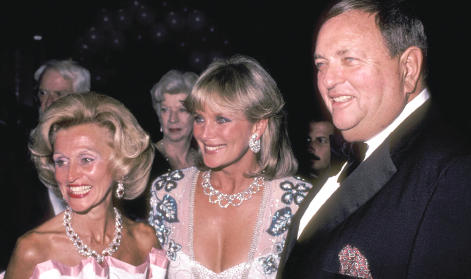
For a dozen years, Denver billionaire and Hollywood heavyweight Marvin Davis owned the Aspen Skiing Company, to the dismay of many locals.
By Jay Cowan
Some said that no one in Aspen had entertained like that since the silver baron days. Others said it depended on what you found entertaining. Either way, when Twentieth Century Fox owner Marvin Davis threw big annual New Year’s parties at his Little Nell Hotel in the late 1980s, “It was just over, over, over the top, with stars and important people and lavish entertaining,” recalls longtime Aspen socialite and owner of The Residence hotel, Terry Butler. “He loved what money could buy. The centerpieces on every table were three feet high, the décor was jewels and flowers and flash.”
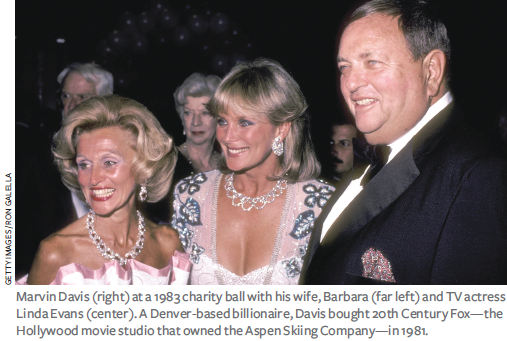
It was impressive for the time, in an old school kind of way. Glamorous guests included Sean Connery, Sly Stallone and Barbra Streisand, mingling with Oprah Winfrey, Steve Ross and Lee Iacocca, being served champagne, caviar and flambés in the increasingly Stoli, sushi and cocaine world of Aspen. Locals had grown accustomed to extravagant lifestyles and partying on a level that made Davis seem almost anachronistic by the time he arrived. The community was less concerned about his social life than by his business tactics, and had reacted with nearly unanimous horror when he bought Fox and the ASC in 1981.
Formed in 1946 by Chicago businessman Walter Paepcke and Austrian ski star Friedl Pfeifer, the Aspen Skiing Corporation opened business on Aspen Mountain on December 14 of that year with what was called the world’s longest chairlift, stretching 6,800 feet. But it struggled to make money for years and only finally succeeded after native Aspenite D.R.C. “Darcy” Brown, an original investor in the corporation, took over as president and general manager in 1957.
Twenty years later, business was golden and when Brown received an offer to sell in December 1977, he recommended it to his board. Twentieth Century Fox would buy all the shares at a hefty price, offering the first-ever return on investment to shareholders. Fox, cash-heavy from its first Star Wars film, was diversifying as it made other real estate buys that included Pebble Beach Resort, and Brown felt they would be a good fit for the ASC. The man who replaced longtime Aspenite Tom Richardson as CEO, Harry Holmes, lived in and also ran Pebble Beach, but left the ASC board of directors intact and poured money back into its operations.
Enter Marvin Davis, a Denver-based, billionaire wildcatter who was the basis for his friend Aaron Spelling’s hit TV show Dynasty. Davis sold his oil business for $600 million, morphed into a corporate raider and with a partner, oil-trader and financier Marc Rich, bought Fox for $720 million in 1981. Word immediately circulated around Aspen that Davis would be selling and spinning off Fox assets such as the ASC, Pebble Beach and others. The ASC brass was told it wasn’t true, but it was.
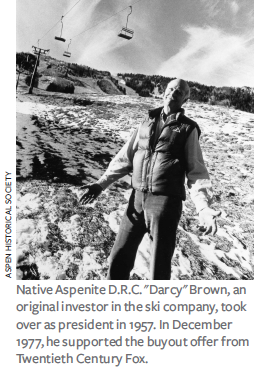 Darcy Brown later said in an interview that, “My only real regret is selling to Twentieth Century, not knowing that Twentieth Century was going to be taken over by Marvin Davis.” He accused Davis of “milking the company” by selling assets and pocketing the profits instead of returning them into the company.
Darcy Brown later said in an interview that, “My only real regret is selling to Twentieth Century, not knowing that Twentieth Century was going to be taken over by Marvin Davis.” He accused Davis of “milking the company” by selling assets and pocketing the profits instead of returning them into the company.
For his part, Brown hadn’t been universally beloved. He could seem patrician and distant and didn’t always care what locals thought. Most assumed it was because he didn’t have to, as he guided the ASC into unpopular ticket price hikes and support for local projects (such as expanding the airport) that weren’t well received. With all of that, however, he was “one of us” to many in the community, which Davis definitely was not. The curmudgeonly Brown began to seem not so bad compared to the new ruling order, a consequence he probably enjoyed.
Davis once said of the entertainment industry, “I love this stuff, the people and the glamour. This isn’t just a business. It’s a helluva lot of fun.” He didn’t feel the same about other Fox assets and quickly began unloading them, including the ASC purchases of Breckenridge ski area, a substantial interest in Whistler Blackcomb, and several Aspen lodges ASC owned for employee housing. Davis ignored any long-term strategy in favor of a quick return on his Fox acquisition.
In 1983, Davis’s Fox partner Marc Rich was indicted by the U.S. Justice Department on 65 criminal counts for violating the Iranian oil embargo during the 1980 hostage crisis. Rich, whose ex-wife Denise still owns a home in Aspen, fled to Switzerland to avoid extradition. Davis bought out Rich’s interest for $116 million and flipped it for $250 million to Rupert Murdoch in 1984.
Aspen meanwhile was deep in an ongoing bout of existential angst centered on how much of its soul it was willing to sell to further its success. For many it seemed as if suddenly an entire way of life, not just the SkiCo, had been auctioned off with no local input and was at the mercy of all those forces they had spent years fighting. Davis’s ethics were much more in tune with making money than making a community. Marc Rich was apparently a major-league criminal. And Murdoch was infamous for his string of sensational tabloid newspapers in Australia, New Zealand and the UK.
Davis spun off the ASC to a subsidiary of Aetna Life and Casualty in 1983, and then to a limited partnership of his called Miller, Klutznick, Davis and Gray, as a string of disgruntled local executives quit along the way, citing the ongoing changes of ownership. The ASC had begun to seem like just another commodity, destined to be constantly traded like so many pork bellies. Then it was taken private for the first time since 1946 and rechristened the Aspen Skiing Company. The Davis partnership kept a 51% interest and sold the rest to the Lester Crown family in 1985. But they continued to hemorrhage managers with Jerry Blann—who had taken over as CEO from Harry Holmes—quitting at the end of 1987, feeling betrayed by ownership over a ticket-pricing controversy.
In a later Vanity Fair story, Marvin Davis recalled, “It took us about six months to figure out what we wanted to do,” with the ASC when he bought Fox. “We decided to build a beautiful hotel, the Little Nell. Then some French firm came to me with the idea of having gondolas so a guy didn’t have to freeze his ass off going up the hill. We wanted to make it one of the best places in America and I think we did.” The Silver Queen gondola debuted in December 1986, transforming the ski experience on Aspen Mountain, while the luxury Little Nell Hotel broke ground that year and opened in 1989.
Putting aside the hubris of Davis claiming to have made the already top-ranked Aspen “one of the best places in America,” some important upgrades were accomplished during his tenure. Current SkiCo president and CEO Mike Kaplan, who wasn’t with ASC during the Davis years, says, “I think they were responsible for focusing the company in Aspen and selling off assets outside of the Roaring Fork Valley, building the Nell and the gondola, and ushering in the era of high-speed quads.”
Perhaps the most telling aspect of the Marvin Davis years in Aspen is that, though people remember the lavish New Year’s parties and all the wheeling and dealing he did with the ASC, there are no stories about him personally. At 6’4” and 300 pounds, he was a large man and sometimes caricatured as the typical American fat cat. So he didn’t go unnoticed in Aspen as much as he simply wasn’t often there, preferring to spend time at the family’s home in Los Angeles. And when he was in Aspen, he didn’t hang out or party with the locals. His relationship with the community was purely professional.
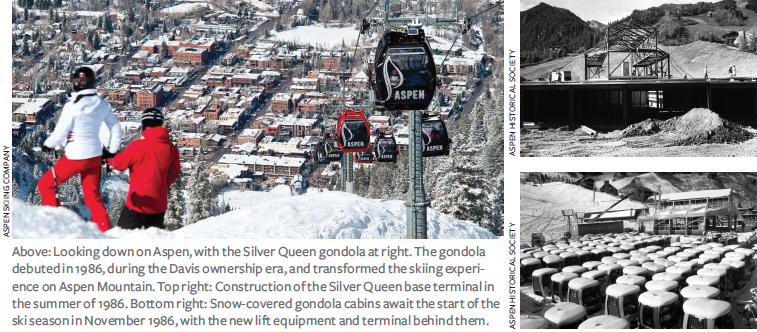
Davis’s other inescapable impact was to dial up Aspen’s visibility as “Hollywood in the Rockies.” It would have seemed almost impossible to do in a town that had been awash with stars since the early 1950s. But the Davis influence, like Davis himself, was big. He and his wife Barbara were generous philanthropists who hosted extravagant charity events, and Fox as well as Warner Brothers owned large houses in Aspen for entertaining their talent. A-list stars including Kevin Costner, Arnold Schwarzenegger, Melanie Griffith, Sally Field and Don Johnson soon arrived along with power players the likes of Michael Eisner and Michael Ovitz.
“The news spread fast in Hollywood that Marvin Davis’s Aspen was the place to play,” the Vanity Fair story breathlessly reported. “You name ’em, they were there,” said Davis.
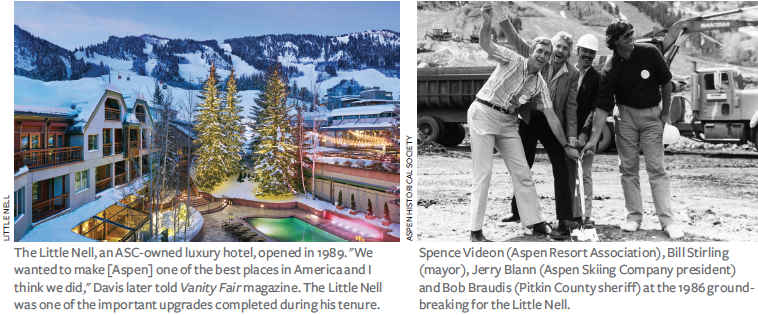
“Davis definitely encouraged more of Hollywood to come here,” says Terry Butler. “And after the gondola was built, they started bringing planeloads of stars in. They could wear their pretty clothes and go to the top of the mountain and didn’t even have to know how to ski that well, since they could ski the top, which was easier terrain, and download on the gondola. The mountain changed and the town changed.”
In 1993, the Crown family of Chicago bought out Davis, assuming 100% ownership of the ASC. They retained Bob Maynard, who had replaced Blann in 1988; Maynard had run Keystone and Robert Redford's Sundance. Since then, there has been none of the executive turmoil that marked the Davis reign—only two CEOs have held the post, each for at least a decade, since Maynard retired in 1996. The Crowns' long-term commitment to the company and genuine involvement in the local community have been widely acclaimed as the best thing that could have happened to Aspen. The Davis era was a wild ride no one wanted to repeat and ultimately, many felt his greatest contribution to town was selling the ASC to the Crowns.
